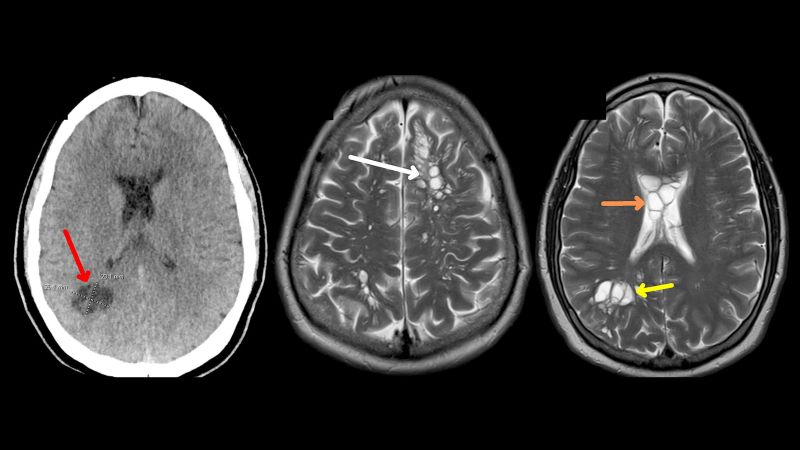From American Journal of Case Reports
A man's migraines were caused by a parasitic tapeworm infection called neurocysticercosis. Arrows point to tapeworm larval cysts.
CNN
—
Parasitic tapeworm larvae were found in the brain of a Florida man with worsening migraines. Report Published this month in the American Journal of Case Reports. Doctors believe tapeworm infection is caused by eating uncooked bacon.
An unidentified 52-year-old man first went to see a doctor after four months of sudden onset of migraines. They happened almost weekly, were very painful and did not respond to migraine medications, the report said.
His doctor ordered a CT scan, which showed multiple cysts — fluid-filled sacs — throughout his brain. Doctors initially suspected he might have a rare neurological condition called congenital neurocysticercosis and admitted him to an Orlando hospital to discuss neurosurgery.
Further labs and imaging at the hospital showed the cysts were parasitic tapeworm larvae that had settled in his brain and caused an infection called neurocysticercosis, the report said.
Cysticercosis is a parasitic tissue infection that occurs when a person ingests tapeworm eggs from the feces of a person with intestinal tapeworm. Tapeworm eggs develop into larval cysts that can infect the brain, muscles, or other tissues. US Centers for Disease Control and Prevention.
Neurocysticercosis is a form of the condition in which the larvae attack the brain. According to the CDC, it is a leading cause of seizures in adults in low-income countries with poor sanitation and free-ranging pigs.
In this case, the man does not have the usual risk factors: he has not traveled to high-risk areas, and he has not been in close contact with pigs or lived in an area with poor sanitation. However, according to the report, he admitted to eating “lightly cooked, not crispy pork.”
Get CNN Health's weekly newsletter
The researchers concluded that humans most likely acquired the parasite through “autoinfection.” He may have eaten cooked pork, which contained larval cysts of an intestinal worm, called tiniasis, and then, after improper hand washing, ingested tapeworm eggs that he passed in his feces, leading to neurocysticercosis.
“This is speculative, but given our patient's prognosis with undercooked pork and benign exposure history, we are inclined to believe that his cysticercosis was transmitted by autoinfection through improper hand washing after contracting taeniasis from his dietary habits,” the report said.
The man was treated with steroids and anti-parasitic drugs. His headaches improved, and the cysts in his brain shrunk, the report said.
According to the CDC, neurocysticercosis is rare and preventable in the United States. People can avoid getting intestinal tapeworms Cooking meat to a safe temperature. and cysticercosis may be present blocked Proper hand washing after using the toilet and before handling food.

